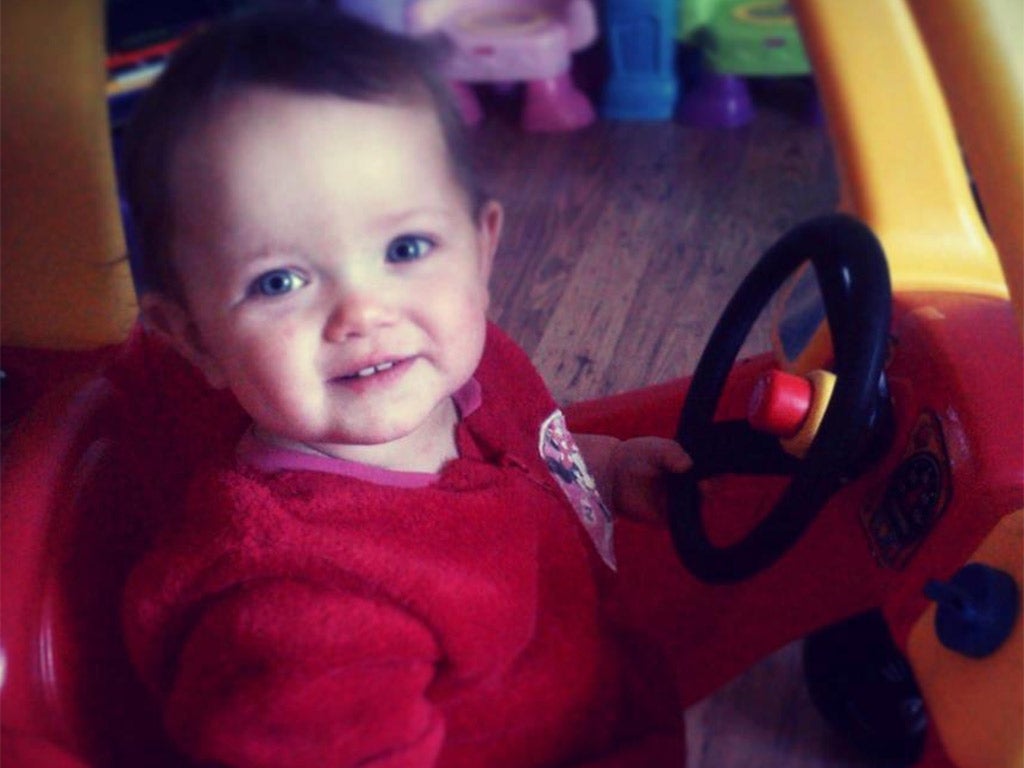Poppi Worthington: Court overturns baby's 'unexplained death' verdict
Much of the mystery is due to a far-reaching injunction after Poppi’s death which prevented the media from revealing various details about the case

Poppi Iris Worthington was just 13 months old when she died in December 2012 and still, nearly three years later, the reasons why remain a secret. This is despite the efforts of several pathologists, a “fact-finding” judgment that remains unpublished, an ongoing Serious Case Review, and a failed police investigation that saw three officers accused of misconduct.
Hopes have now been raised, however, that the truth will finally out. Two High Court justices quashed the original “irregular” inquest into her death and ordered a fresh inquiry into how the toddler, from Barrow-in-Furness, Cumbria, died.
Lord Justice Burnett and Mr Justice Holroyde said there was a “clear case” for new proceedings. Lord Justice Burnett agreed the original inquest, with evidence heard in private, was irregular.
Much of the mystery is due to a far-reaching injunction after Poppi’s death which prevented the media from revealing various details about the case, including the hospital in which she died. As a result her inquest, last October, took place partly in private, and took just seven minutes to deliver an “unexplained” verdict.
Ian Smith, the original coroner, now retired, had said the cause of Poppi’s death could not be ascertained. He was “satisfied” that the findings of the family court judge Mr Justice Peter Jackson at a private fact-finding hearing, based on medical evidence from three pathologists, were sufficient. Those conclusions have still not been published.
Lawyers for several newspaper groups subsequently wrote to David Roberts, the senior coroner for Cumbria, arguing the inquest was insufficient and therefore unlawful. Mr Roberts told the High Court that a fresh inquiry was both necessary and “in the interests of justice”. The High Court judges agreed.
Lord Justice Burnett said Mr Smith had adopted the facts found by the family court judge, Mr Justice Jackson, which were not made public or properly recorded at the inquest.
Mr Justice Jackson said it remained his intention that his judgment “shall be published when it can be”. He had previously said his findings must remain undisclosed in case they prejudiced any criminal trial.
The judge had been dealing with family proceedings connected to the case in the Family Division of the High Court, and raised issues about the manner in which Poppi’s death was investigated.
Publication of the family court findings was further complicated by a request from Poppi’s father, Paul Worthington, who was granted a review of the medical evidence relating to his daughter’s death, to be heard in November. Mr Justice Jackson ruled it would be unfair to publish his findings prior to the review.
A Serious Case Review into Poppi’s contact with social service and other agencies, led by Cumbria’s Local Safeguarding Children Board, has now been put on hold pending the new inquest.
Two people were arrested following Poppi’s death: Mr Worthington, 46, who was questioned on suspicion of sexually assaulting his daughter; and a 31-year-old woman who cannot be named. Both were released without charge. It also emerged at the time that three Cumbria police officers were questioned under caution over misconduct allegations.
The force referred itself to the Independent Police Complaints Commission (IPCC), which has concluded its investigation over whether opportunities to obtain “key evidence” were “identified and appropriately acted upon” by police. An IPCC spokeswoman said: “We intend to await the conclusion of the new inquest into the child’s death and the force’s disciplinary proceedings before publishing any findings from the investigation.”
A spokesman for Cumbria Police said: “A number of officers are subject of this investigation. An officer was previously suspended by the Constabulary. However the officer in question has since retired and therefore can no longer be suspended. The Constabulary continues to engage with and await the outcome of the IPCC investigation.”
